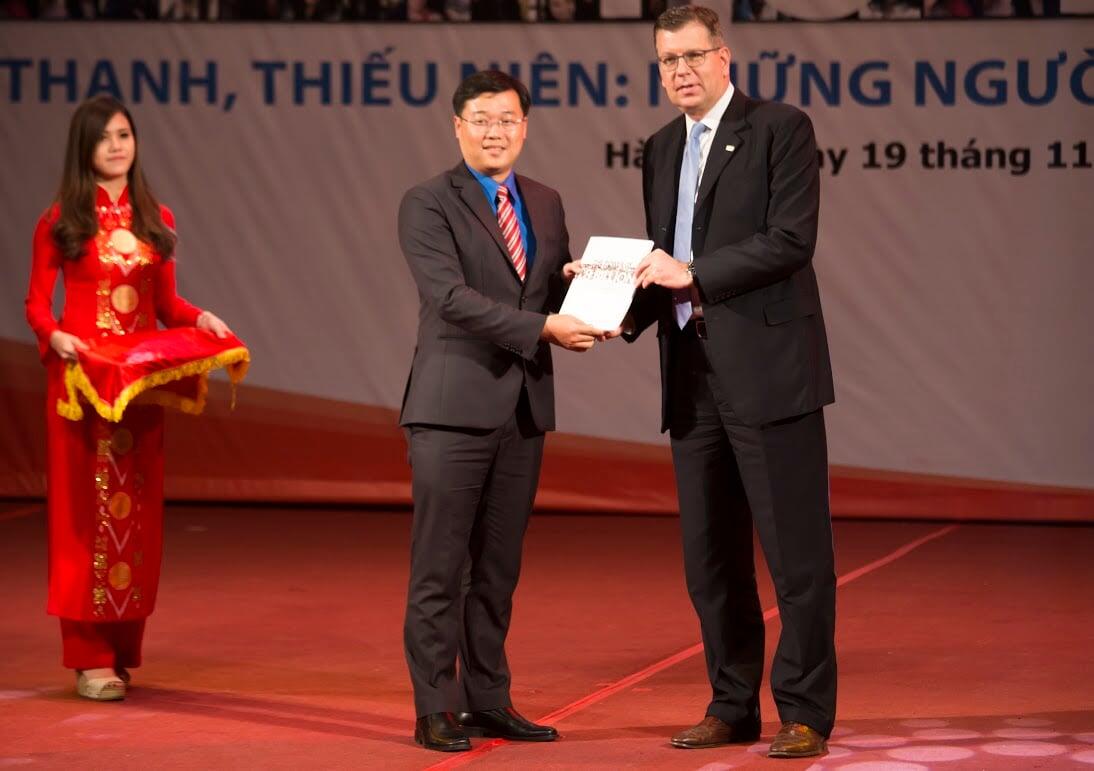HA NOI, 19 November 2014 – Developing countries with large youth populations could see their economies soar, provided they invest heavily in young people’s education and health and protect their rights, according to The State of World Population 2014, released today in Ha Noi by the United Nations Population Fund (UNFPA) in collaboration with the Center for the Central Youth and Adolescents.
The potential economic gains would be realized through a “demographic dividend,” which can occur when a country’s working age population is larger than the population that is dependent and younger, the report shows.
But to maximize the dividend, countries must ensure their young working-age populations are equipped to seize opportunities for jobs and other income-earning possibilities.
“Today’s record 1.8 billion young people present an enormous opportunity to transform the future,” says UNFPA Executive Director, Dr. Babatunde Osotimehim at the global launch of the report. “Young people are the innovators, creators, builders and leaders of the future. But they can transform the future only if they have skills, health, decision-making, and real choices in life,” he adds.
With the right policies and investments in human capital, countries can empower young people to drive economic and social development and boost per-capita incomes, the new UNFPA report states.
Nine in ten of the world’s young people today live in less developed countries. Because of lagging social services, these countries face greater obstacles to leveraging the advantages that can result from engaging a youthful, productive workforce.
The UNFPA report shows that demographic shifts taking place in about 60 countries are opening a window for a demographic dividend. The size of the dividend depends largely on how those countries invest in young people to realize their full potential.
Addressing the launching event in Ha Noi, Mr. Arthur Erken, UNFPA Representative in Viet Nam said: “Viet Nam has entered a "golden population" period, recording the highest proportion of young people in Viet Nam’s history. Young people between the ages of 10 to 24 years old now represent nearly 40 per cent of the total population. This so-called 'demographic window of opportunity', which remains open until 2040, presents Viet Nam with a one-time and unique opportunity in its history to plan for this population transformation, to make this golden period the driver for socio-economic prosperity the way other countries in Asia have so successfully done, by ensuring that everyone counts and that every young person is educated and supported to achieve their full potential. We can't afford to let this period be wasted. Now is the time to invest in our young people!".
"Demographic dividend occurs only once in the country's history, we need to take advantages of this opportunity to maximize benefits of the dividend for the country's socio-economic development," said Mr. Le Quoc Phong, Secretary of the Viet Nam Youth's Union. He also urged the Government ministries and agencies to strengthen Vietnamese youth's participation in designing and analyzing the policies that affect them to ensure that the policies and services respond to their actual needs.
Adolescents and youth are central to the future development agenda. Safeguarding their rights and investing in their future by providing quality education, decent employment, effective livelihood skills, and access to sexual and reproductive health and comprehensive sexuality education that emphasizes gender equality, is essential to their development and that of their families, communities and the country as a whole. Investing in our youth is an investment in our future.
For further information, please contact:
Ms Nguyen Thi Hong Thanh
UNFPA Communications
Tel: ![]() (84-4) 3822 4383 – Ext: 117
(84-4) 3822 4383 – Ext: 117
Mob: ![]() 091 309 3363
091 309 3363
Email: tnguyen@unfpa.org


